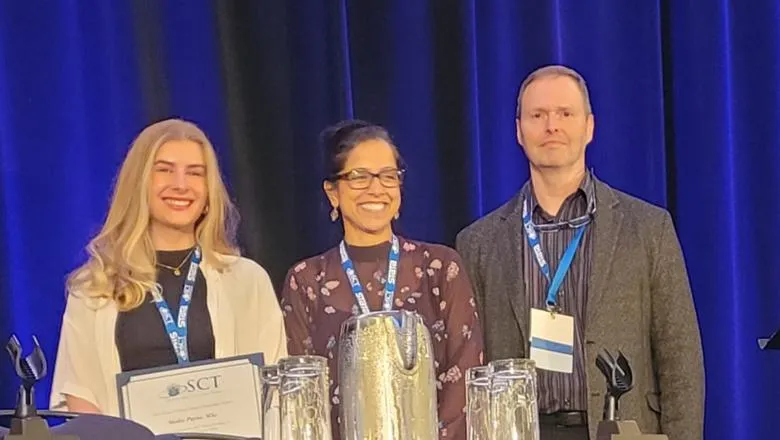It was an honour to present my work at the Society for Clinical Trials and to receive this award. I’m passionate about developing methods that can make complex trial data more meaningful and accessible, especially in areas like psychotherapy where participant engagement can vary so much. I’m incredibly grateful for the support I’ve had from my supervisors and colleagues at King’s, and from the NIHR – this recognition means a lot to me as an early career researcher.
Mollie Payne, NIHR Doctoral Research Fellow, IoPPN
06 June 2025
Mollie Payne awarded the Society for Clinical Trials Thomas C. Chalmers Student Scholarship
Mollie Payne wins the Thomas C. Chalmers Student Scholarship at the 2025 Society for Clinical Trials Annual Meeting in Vancouver, Canada.

Mollie Payne is a National Institute for Health and Care Research (NIHR) Doctoral Research Fellow at the Institute of Psychiatry, Psychology & Neuroscience (IoPPN), King’s College London. Selected as one of three finalists from a highly competitive list of applicants, Mollie was the final winner awarded for her innovative submission titled Dose Outcome Using Stratified Estimation With Random Forest Method (DOSE-RF): A Novel Approach to Dose-Response Modelling in Complex Interventions.
Her win marks the first time a King’s researcher has received this prestigious award, which recognises outstanding future trial methodologists and trialists.
At the conference, Mollie used clinical trial data to illustrate the power and applicability of DOSE-RF, with a focus on making the complex statistical techniques accessible to a broad audience. Her application was recognised for its clarity, practical relevance and innovative use of methodology.
Mollie’s method offers a new way to understand how different ‘doses’ or amounts of a treatment influences outcomes in clinical trials, for example, how varying levels of medication taken by participants might affect recovery rates. It uses a type of artificial intelligence called machine learning – specifically, an approach known as random forest – alongside statistical techniques designed to estimate the effects of a treatment even when participants receive different amounts or adhere to the treatment in different ways. This is especially useful in trials of complex interventions, such as behavioural or psychological treatments, where not all participants follow the same treatment path and traditional models can struggle to account for that variation.
Mollie’s work is an excellent example of the kind of innovation we aim to support through our NIHR-funded portfolio on clinical trials methodology. Her contribution aligns closely with the of the King’s Clinical Trials Unit's mission to deliver excellence in clinical trials that have real-world impact and ultimately benefit patients and society.
Professor Richard Emsley, NIHR Research Professor and Academic Director of the King’s Clinical Trials Unit
The Society for Clinical Trials is an internationally recognised organisation based in the United States, dedicated to advancing human health through excellence in clinical trial research and methodology. Its annual meeting brings together experts from academia, industry and government to share the latest developments in optimal trial methodologies and practices.
This recognition highlights the global contribution of King’s researchers to advancing methods in clinical trials, reinforcing the IoPPN’s commitment to methodological innovation in mental health research.


